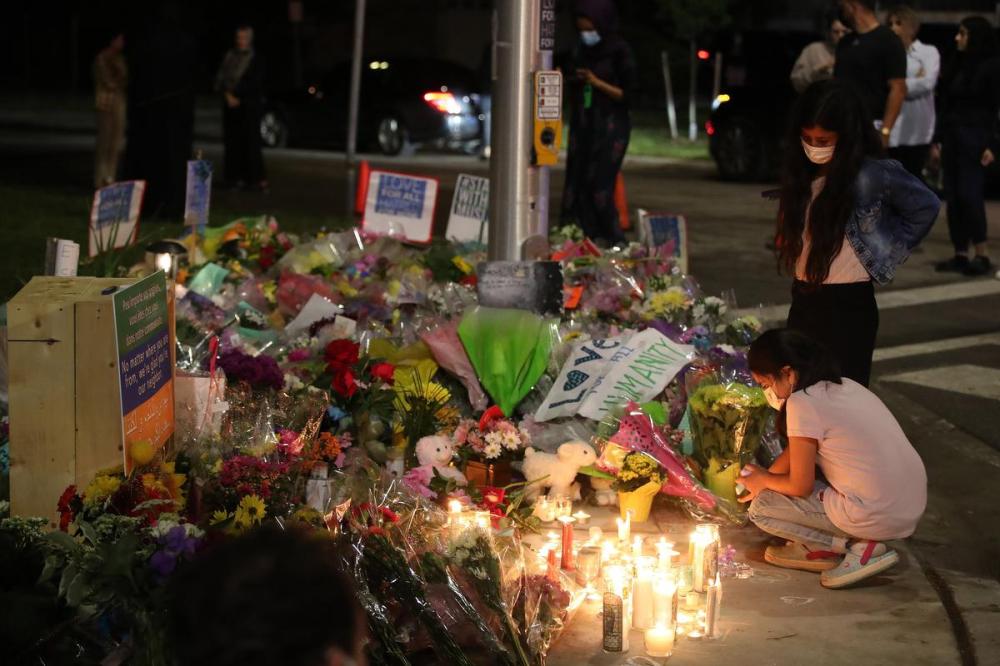The senseless murder of a family walking down the street is an atrocity — one that begins with subtle forms of Islamophobia in Canada
Advertisement
Read this article for free:
or
Already have an account? Log in here »
To continue reading, please subscribe:
Monthly Digital Subscription
$0 for the first 4 weeks*
- Enjoy unlimited reading on winnipegfreepress.com
- Read the E-Edition, our digital replica newspaper
- Access News Break, our award-winning app
- Play interactive puzzles
*No charge for 4 weeks then price increases to the regular rate of $19.00 plus GST every four weeks. Offer available to new and qualified returning subscribers only. Cancel any time.
Monthly Digital Subscription
$4.75/week*
- Enjoy unlimited reading on winnipegfreepress.com
- Read the E-Edition, our digital replica newspaper
- Access News Break, our award-winning app
- Play interactive puzzles
*Billed as $19 plus GST every four weeks. Cancel any time.
To continue reading, please subscribe:
Add Free Press access to your Brandon Sun subscription for only an additional
$1 for the first 4 weeks*
*Your next subscription payment will increase by $1.00 and you will be charged $16.99 plus GST for four weeks. After four weeks, your payment will increase to $23.99 plus GST every four weeks.
Read unlimited articles for free today:
or
Already have an account? Log in here »
Hey there, time traveller!
This article was published 13/06/2021 (1644 days ago), so information in it may no longer be current.
Muslims are angry; we are grieving. Within this grief, there is a cry for help. Our community is still grappling with the terrorist attacks by white supremacists that took place in Quebec City and Toronto, and now from the horrific killings in London, Ont.
Once again, remind us of the reality of racism and discrimination in this country.
Unfortunately, equating Muslims with terrorists and acts of extremism has become disturbingly common. Vilifying and marginalizing us in public discussions and through negative political narratives has had deadly consequences, leaving us in a constant state of vigilance.

Many accounts of Islamophobia are being shared in the media that speak to the constant state of fear that many live with. Clinical psychologist Rehman Abdulrehman recently stated that “there is an ongoing level of psychological terrorism that happens because of systemic racism and Islamophobia in our society, that gets people to pull back … it is what gets us to be afraid. Fear is the common element that prevents people from normal reactions and the expectation to be protected.”
These conversations have failed to depict how prevalent Islamophobia is in the workplace, as many don’t speak up due to the fear of reprisal. I have rarely shared my personal experiences working in government over 15 years — experiences that are not isolated from those of other Muslims.
Although I am Muslim, I am “passing” because there are no visible identity markers that would show what religion or faith I belong to. Unlike other members of the community who may be Black, wear hijabs and have Muslim-sounding names, my experience has been relatively more covert.
For instance, the day after 9/11, I was serving the counter at the constituency office for my MP when a man came into the office. He told me that we must take all Muslims, put them on an island and blow it up.
When I started working in the provincial government, I overheard a member of the senior leadership say, “I can’t trust someone who won’t share a drink with me.” I was within earshot, and they knew consumption of alcohol is forbidden in Islam. The degree of my “Muslimness” has also come into question — I’ve been told “people are worried that you are too Muslim” and that I “needed to represent all communities.” These are examples of religious discriminations that took place in our highest offices, and left me feeling unsafe in my workplace.
These examples are similar to findings in my scholarly research that highlight the compounding element in one’s experience with racism and Islamophobia within the workplace. Other research I have conducted discusses the negative effects of Islamophobia on Muslim women’s mental health. My research has left me targeted by a right-wing group.
I share these instances not to take away from the tragedy in London, but to show these events are everyday occurrences to many Muslims. The senseless killing of a family simply walking down the street is an atrocity — one that begins with subtle forms of religious discrimination and racial microaggressions.
As a result, we look to our governments for protection and security, but are constantly faced with their refusal to take real action on Islamophobic issues. Instead, we see Islamophobia happening at all levels: in government institutions, workplaces, subway stations, grocery stores and even on the sidewalks.
We need more from our political leadership than showing up to a mosque or a vigil after an attack. A step forward would be to act in dismantling white supremacist organizations and support the request by the National Council for Canadian Muslims for a National Summit on Islamophobia with all levels of government.
Education is critical if we want to reduce the hatred that stems from misinformation. We need our governments to lead the way — to not only have the conversation, but to actively dismantle hate. As an ally, ask yourself if you have done enough to unlearn these overt and covert biases that seek to divide us. We owe it to the surviving child and the families of those lives that have been destroyed.
Ruby Latif is a Toronto-based community mobilizer, Liberal strategist and a contributing columnist for the Star. Follow her on Twitter: @rubylatif


